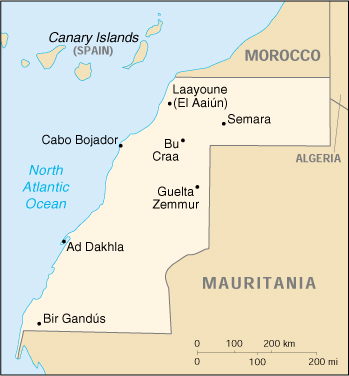

Status Quo Side: Spain, Morocco
Non-Status Quo Side: Polisario/SADR
Region: Africa
Conflict Type: External Intervention
Issues in Dispute: Resources, Territory
A desert area of sparse populations, W. Sahara has one of the world's largest phosphate deposits, an Atlantic coastline, a deep-water port at Dahkla, and proximity to Gibraltar. In 1970 Morocco withdrew its claim to Mauretania [see MOM] but not to Spanish (Western) Sahara [see MOS]. The area's "Moorish" population asserted a counter-claim including part of Morocco. In 1973 the "Popular Front for the Liberation of Saquia el Hamra and Rio del Oro" (Polisario) was founded with Algerian and Mauretanian backing to seek independence from Spain. Spanish troops clashed with rebel saboteurs and tensions between Morocco and Algeria grew. In 1974 King Hassan II, courting domestic support, reasserted Morocco's claim. By 1975 Spanish-Moroccan clashes were reported. The International Court of Justice, backed by the UNGA rejected the claims of both countries. In October a UN mission found most Saharans wanting independence.
King Hassan organized a "Green March" of 350,000 unarmed volunteers to claim Spanish Sahara. Spain averted confrontation by permitting joint Moroccan-Mauritanian administration despite Algerian and Polisario protests.
Polisario and Moroccan troops clashed. Agreement between Morocco, Mauretania and Spain gave Mauretania the southern 1/3 and Morocco the rest, excluding Algeria. Although officially neutral, US continued aid to Morocco. In February 1976 Polisario claimed statehood for a Saharan Arab Democratic Republic (SADR) which was recognized by Algeria. Morocco severed relations. Mauretania withdrew its claim in 1979, Morocco claimed the whole territory, and a small French peacekeeping force moved to the Mauretanian border. SADR was admitted to the OAU in 1982 and ultimately recognized by 71 states. Spurning a proposed UN referendum, Morocco built a 900-mile almost impregnable wall enclosing 2/3 of the territory. Algeria and Morocco resumed diplomatic relations in May 1988. In August Polisario and Morocco accepted in principle a joint UN-OAU initiative for a cease-fire, a UN peacekeeping force and a UN-supervised referendum. In October 1989 no progress was reported while significant fighting continued.
Agreement was reached on a temporary cease-fire. In June 1990 the UNSC unanimously approved the UN-OAU initiative, and the UNSYG sought an indefinite extension of the cease-fire, monitored by 230 UN observers sent in 1991. The UN referendum scheduled for January 1992 was postponed and the mandate of the UN forces extended to May, 1996. However, defections by guerrilla leaders and some thousand dissidents in 1992, and the movement of thousands of Moroccans into newly-built housing in the area, appeared to be gradually tilting the balance of opinion against independence. In 1997 former US Secretary of State James A. Baker III was appointed by UN SYG Kofi Annan to advise on peace plans for the conflict. The UN "Mission for the Referendum in Western Sahara" in April 1998 cleared the way for the long-deferred referendum by identifying eligible voters, but disagreements remained and it was not clear that Morocco will accept unfavorable results. However, in February, 2000, Polisario Front leader Mohammed Abdelaziz said the long-delayed referendum would be possible before the end of the year.